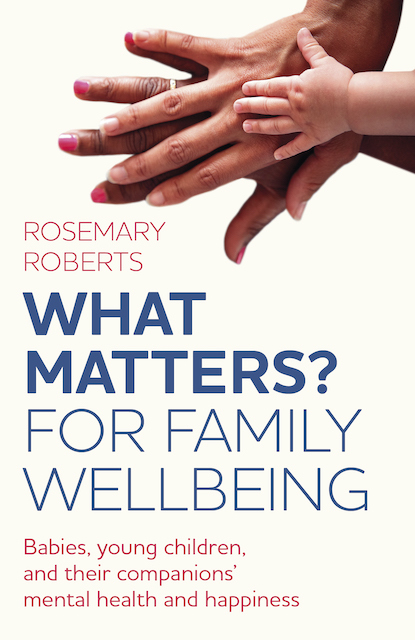
WHAT MATTERS? for family wellbeing is a sense-of-direction book in a changing world, about babies’ and young children’s relationships with their companions. It’s written for parents, grandparents and other family members – everyone they see often and know well, and where there’s love or affection. Based on research, the book is deliberately inexpensive, short and easy to read, because it is written for very busy and often completely exhausted readers! Being companionable with the youngest children nurtures belonging and is a kind of caring attachment, one of the greatest gifts we can give.
What Matters? explains how behaviour goes hand in hand with belonging. It’s like two sides of one coin. Children need to be aware of how to behave, and how not to behave – their behaviour matters. Explaining clearly and companionably in early childhood how belonging and behaviour go together is enormously helpful for young children, for teenagers, and for family wellbeing generally. A huge help with behaviour that’s explained in What Matters? is the maxim “Say yes as often as you can; but when you say no, mean it”. Saying “yes” as often as possible helps with all sorts of companionable learning situations at home.
Can we teach positive learning attitudes? What Matters? says we don’t need to. This is because babies from the day they are born already have perfect attitudes to learning. These attitudes (or dispositions) are about being observant, attentive, curious, exploratory and experimental. They are also about imitating, concentrating, and persisting. Babies and small children do all these things, but are they really good at concentrating and persisting?
There is a popular idea that they don’t know how to learn until we teach them, and that children need to be taught how to concentrate and not give up. But what about the times when we have to drag them away from something they are enjoying, like playing with water in the bath, their favourite TV, or the playground? Actually their concentration is excellent, if it’s on something they are interested in. Harder is when we adults want them to learn about things they’re not interested in (surely just like us!). Perhaps the question is not “Can we teach these positive learning attitudes?” but “How can we make sure that children don’t lose them?”
Much of What Matters? is about the reader making sure to be "good enough". Here are some useful chapter headings, with suggestions that won’t break the bank!
More information, and the link to 11 podcast episodes, click here.